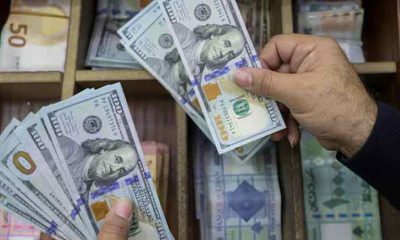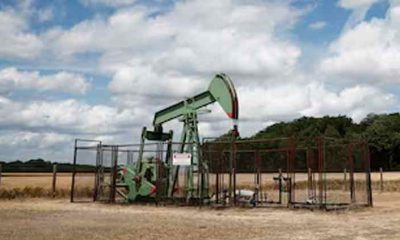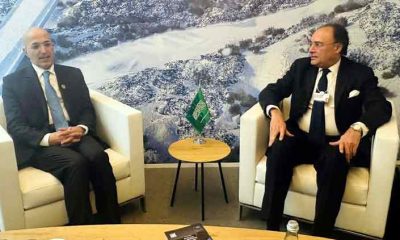World
Biden pledges solidarity with Israelis
Biden pledges solidarity with Israelis
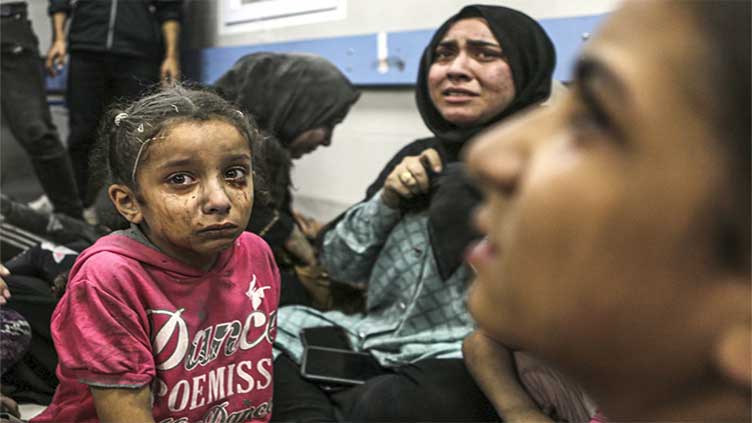
President Joe Biden vowed to show the world that the U.S. stands in solidarity with Israelis during his visit there Wednesday, and offered an assessment that the deadly explosion at a Gaza Strip hospital apparently was not carried out by the Israeli military.
“Based on what I’ve seen, it appears as though it was done by the other team, not you,” Biden told Israeli Prime Minister Benjamin Netanyahu during a meeting. But Biden said there were “a lot of people out there” who weren’t sure what caused the blast.
Biden didn’t offer details on why he believed the blast was not caused by the Israelis. The Hamas-run Gaza Health Ministry said an Israeli airstrike caused the destruction and hundreds of deaths. The Israeli military denied involvement and blamed a misfired rocket from the Palestinian Islamic Jihad, another militant group. However, that organization also rejected responsibility.
IBiden had been scheduled to visit Jordan to meet with Arab leaders after the stop in Israel, but the summit was called off after the hospital explosion. And his remarks spoke both of the horrors the Israelis had endured, but also the growing humanitarian crisis for Palestinian civilians in Gaza.
He told Netanyahu he was “deeply saddened and outraged” by the hospital explosion. He stressed that “Hamas does not represent all the Palestinian people. and it has brought them only suffering.”
Biden spoke of the need to find ways of “encouraging life-saving capacity to help the Palestinians who are innocent, caught in the middle of this.”
But he also said Hamas had “slaughtered” Israelis in the Oct. 7 attack that killed 1,400 people. Biden described at length the horror of the killing of innocent Israelis, including children.
“Americans are grieving, they really are,” Biden said. “Americans are worried.”
Netanyahu thanked Biden for coming to Israel, telling him the visit was “deeply, deeply moving.”
“I know I speak for all the people of Israel when I say thank you Mr. President, thank you for standing with Israel today, tomorrow and always.”
Netanyahu said Biden had rightly drawn a clear line between the “forces of civilization and the forces of barbarism,” saying Israel was united in its resolve to defeat Hamas.
“The civilized world must unite to defeat Hamas,” he said.
Biden also planned to meet Israeli first responders and the families of victims and hostages. Netanyahu met Biden at Ben Gurion Airport and the two embraced. It was almost exactly a month ago that they sat together at the United Nations General Assembly, where Netanyahu marveled that a “historic peace between Israel and Saudi Arabia” seemed within reach.
The possibility of improved relations between Israel and its Arab neighbors appears to be dimming; Israel has been preparing for a potential ground invasion of Gaza in response to Hamas’ attacks.
Roughly 2,800 Palestinians have been reported killed by Israeli strikes in Gaza. Another 1,200 people are believed to be buried under the rubble, alive or dead, health authorities said.
Those numbers predate the explosion at the Al-Ahli hospital on Tuesday. No clear cause has been established for the blast.
Protests swept through the region after the blast at the hospital, which had been treating wounded Palestinians and sheltering many more who were seeking a refuge from the fighting.
Hundreds of Palestinians flooded the streets of major West Bank cities including Ramallah. More people joined protests that erupted in Beirut, Lebanon and Amman, Jordan, where an angry crowd gathered outside the Israeli Embassy.
Outrage scuttled Biden’s plans to visit Jordan, where King Abdullah II was to host meetings with Palestinian President Mahmoud Abbas and Egyptian President Abdel Fattah el-Sissi. But Abbas withdrew in protest, and the summit was subsequently canceled outright.
Ayman Safadi, Jordan’s foreign minister, told a state-run television network that the war is “pushing the region to the brink.”
Jordan declared three days of mourning after the hospital explosion and Safadi said the summit was canceled after speaking with all leaders. He said they had wanted the meeting to produce an end to the war, which seems unlikely now, and to give Palestinians the respect they deserve. Kirby said Biden understood the move was part of a “mutual” decision to call off the Jordan portion of his trip. He said Biden would speak to the Arab leaders by phone as he returned to Washington.
Riyad Mansour, the Palestinian U.N. ambassador, said Tuesday that Biden was “capable of telling Israel, Enough is enough.”
“You have to stop this carnage against the Palestinian people in the Gaza Strip. Let this stop. Let humanitarian assistance take place,” he said. “Do not displace two million Palestinians and push them in the direction of Jordan and then let’s begin a political horizon.”
There are also fears that a new front could erupt along Israel’s northern border with Lebanon, where Hezbollah operates. The Iran-backed organization has been skirmishing with Israeli forces.
Always a believer in the power of personal diplomacy, Biden’s trip will test the limits of U.S. influence in the Middle East at a volatile time. It’s his second trip to a conflict zone this year, after visiting Ukraine in February to show solidarity with the country as it battles a Russian invasion.
The visit to Israel coincides with rising humanitarian concerns in Gaza, where Israel has cut off the flow of food, fuel and water. Mediators have been struggling to break a deadlock over providing supplies to desperate civilians, aid groups and hospitals.
U.S. Secretary of State Antony Blinken, bouncing back and forth between Arab and Israeli leadership ahead of Biden’s visit, spent seven and a half hours meeting Monday in Tel Aviv in an effort to broker some kind of aid agreement and emerged with a green light to develop a plan on how aid can enter Gaza and be distributed to civilians.
Although only a modest accomplishment on the surface, U.S. officials stressed that Blinken’s talks led to a significant change in Israel’s position going in — that Gaza would remain cut off from fuel, electricity, water and other essential supplies.
U.S. officials said it has become clear that already limited Arab tolerance of Israel’s military operations would evaporate entirely if conditions in Gaza worsened.
Their analysis projected that outright condemnation of Israel by Arab leaders would not only be a boon to Hamas but would likely encourage Iran to step up its anti-Israel activity, adding to fears that a regional conflagration might erupt, according to four officials who spoke to The Associated Press on condition of anonymity to discuss internal administration thinking.
World
Shooting, explosions in Jenin as Israel presses raid

Gunfire and explosions rocked the Jenin area of the occupied West Bank on Wednesday, an AFP journalist reported, as the Israeli military kept up a large-scale raid for a second day.
The operation, launched just days after a ceasefire paused more than a year of fighting in Gaza, has left at least 10 Palestinians dead, according to Palestinian health authorities.
Israeli officials have said the raid is part of a broader campaign against militants in the West Bank, citing thousands of attack attempts since the Gaza war erupted in October 2023.
“The situation is very difficult,” Jenin governor Kamal Abu al-Rub told AFP.
“The occupation army has bulldozed all the roads leading to Jenin camp and to the Jenin government hospital… There is shooting and explosions,” he added, referring to the Israeli military.
Israeli forces have detained around 20 people from villages around Jenin since the operation began on Tuesday, the official said.
An AFP correspondent reported hearing gunfire and explosions from the northern city’s refugee camp, a hotbed of militancy where Israeli forces have carried out repeated raids.
In December, Jenin area militants also clashed with the security forces of the Ramallah-based Palestinian Authority.
‘IRON WALL’
The Israeli military said it was continuing with the operation, dubbed “Iron Wall”, adding that it had “neutralised over 10 terrorists”.
“Additionally, aerial strikes on terror infrastructure sites were conducted and numerous explosives planted on the routes by the terrorists were dismantled,” it said in a statement.
The raid in Jenin aims to counter “hundreds of terrorist attacks, both in Judea and Samaria (the occupied West Bank) and the rest of Israel,” military spokesman Nadav Shoshani said at a press briefing.
He said that since the start of the Gaza war, Israel had seen “over 2,000 terror attack attempts” from the West Bank, adding that the army had “eliminated around 800 terrorists”.
Shoshani said the explosive devices planted along roads had recently killed a soldier in the area.
Islamic Jihad, one of the factions present in Jenin, condemned what it called “the systematic displacement, destruction and killing carried out by the occupation army against Jenin refugee camp”.
The Palestinian Authority’s foreign ministry accused Israel of “collective punishment” and said the raid was part of an Israeli plan aimed at “gradually annexing the occupied West Bank”.
‘DECISIVE OPERATION’
Defence Minister Israel Katz vowed to continue the raid in Jenin.
“It is a decisive operation aimed at eliminating terrorists in the camp,” Katz said in a statement on Wednesday, adding that the military would not allow a “terror front” to be established there.
“It is a key lesson learnt from Gaza… we do not want terrorism to recur in the camp once the operation ends,” he said.
Prime Minister Benjamin Netanyahu said the raid aimed to “eradicate terrorism” in Jenin.
He linked the operation to a broader strategy of countering Iran “wherever it sends its arms — in Gaza, Lebanon, Syria, Yemen” and the West Bank.
The Israeli government has accused Iran, which supports armed groups across the Middle East, including Hamas in Gaza, of attempting to funnel weapons and funds to militants in the West Bank.
United Nations Secretary-General Antonio Guterres called for “maximum restraint” from Israeli security forces and expressed deep concern, deputy spokesman Farhan Haq said.
Violence has surged throughout the occupied West Bank since the Gaza war erupted on October 7, 2023.
According to the Palestinian health ministry, Israeli troops or settlers have killed at least 848 Palestinians in the West Bank since the conflict began.
During the same period, at least 29 Israelis, including soldiers, have been killed in Palestinian attacks or Israeli military operations in the territory, according to Israeli official figures.
World
Saudi Arabia plans 600bn dollars in new US investment, trade over four years

Saudi Arabia Crown Prince and Prime Minister Mohammed bin Salman told President Donald Trump that the kingdom wants to put $600 billion into expanded investment and trade with the United States over the next four years, the Saudi State news agency said early on Thursday.
The crown prince expressed it during a phone call with Trump, who took oath for his second term on January 20.
During the call, the crown prince conveyed the congratulations of King Salman bin Abdulaziz Al Saud and his own congratulations to the President on the occasion of his inauguration, and wished the friendly American people more progress and prosperity under the President’s leadership.
The two leaders discussed ways for cooperation between the Kingdom and the US to promote peace, security and stability in the Middle East, in addition to enhancing bilateral cooperation to combat terrorism.
The leaders also discussed ways to enhance bilateral ties in various areas, and the crown prince noted the US administration’s ability to create unprecedented economic prosperity and opportunity through anticipated reforms in the United States, and that the Kingdom seeks to participate in these opportunities for partnership and investment.
The US president expressed his appreciation and thanked the Saudi leadership for their congratulations, and affirmed his keenness to work with the Kingdom on all that benefits the interests of both countries.
Trump said following his inauguration on Monday that he would consider making Saudi Arabia his first destination for a foreign visit if Riyadh agreed to buy $500 billion worth of American products, similar to what he did in his first term.
“I did it with Saudi Arabia last time because they agreed to buy $450 billion worth of our product. I said I’ll do it but you have to buy American product, and they agreed to do that,” Trump said, referring to his 2017 visit to the Gulf kingdom.
World
US decision to cancel Afghan refugee resettlement exposes Western hypocrisy

An executive order by US President Donald Trump to suspend resettlement of all refugees, including Afghans, for an indefinite period is being seen as a betrayal of those who supported the International Security Assistance Force (ISAF) and NATO in Afghanistan.
Nearly 1,660 Afghans cleared by the US government to resettle in the US, including family members of active-duty US military personnel, are in limbo since the Trump-led administration took extreme decision.
The order has left them stranded while it is expecting from Pakistan, which has hosted millions of Afghans for decades on humanitarian grounds, to share the burden again.
Instead of easing the burden, the US ban has only intensified challenges for Pakistan and other neighbouring host countries.
Furthermore, the western countries, which have been criticising Pakistan for repatriation of illegal immigrants, are refusing to accept refugees by giving lame excuses, abandoning Afghan refugees when they need help the most.
The Human Rights Watch (HRW), the Amnesty International and the EU keep an eye on Pakistan’s policies while there is no focus on the hypocrisy being showed by the Western countries by banning refugees after using them as pawns.
The international community must hold the US and EU accountable for their bans and pressure them to contribute fairly to managing the Afghan refugee crisis.
Trump made an immigration crackdown a major promise of his victorious 2024 election campaign, leaving the fate of US refugee programmes up in the air.
The State Department on Wednesday implemented the order, announcing that all refugee arrivals were indefinitely suspended, all previously scheduled travel cancelled and new refugee applications, as well those in process, were suspended.
-

 Business2 months ago
Business2 months agoAuto industry’s shift toward EVs is expected to go on despite Trump threat to kill tax credits
-

 Entertainment3 months ago
Entertainment3 months agoBeyoncé leads the 2025 Grammy noms, becoming the most nominated artist in the show’s history
-

 Business3 months ago
Business3 months agoWall Street cruises toward the close of its best week in a year
-
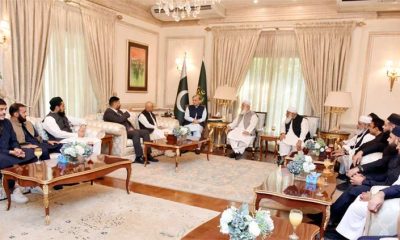
 pakistan3 months ago
pakistan3 months agoPM Shehbaz terms promotion of foreign investment as top priority
-
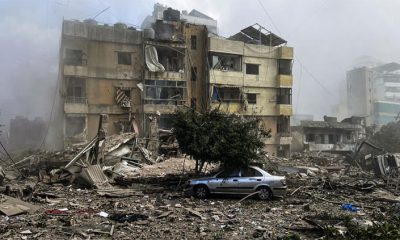
 World2 months ago
World2 months agoSix Israeli troops killed, deadly strikes in Lebanon
-

 Entertainment2 months ago
Entertainment2 months agoMovie Review: ‘Red One’ tries to supersize the Christmas movie
-

 Business2 months ago
Business2 months agoWall Street gains ground as it notches a winning week and another Dow record
-
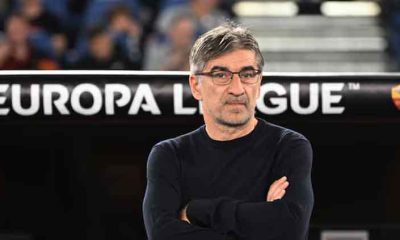
 Sports1 month ago
Sports1 month agoSouthampton set to sign Juric as new manager







